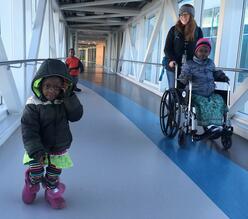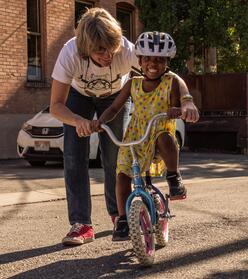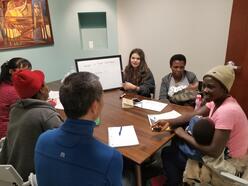Part two in a three-part series, these deep dives better explain the process of refugee resettlement in Salt Lake City. Last month, the deep dive covered the basics of who refugees are and initial resettlement in the U.S. This month, the focus is on refugee resettlement in Salt Lake City during the first 24-months after arrival, including the efforts of the International Rescue Committee (IRC) in Salt Lake City to help families positively integrate and thrive in their new community.

The days following arrival to Salt Lake City are a flurry of activity and culture shock for newly arrived refugee families and individuals. As they become familiar with their new surroundings, the IRC takes action to ensure questions are answered, needs are met, and families soon focus on reaching self-sufficiency as soon as possible. Through a robust network of staff and volunteers, the IRC helps refugees learn about life and customs in the U.S., secure jobs, enroll in English classes, make sure kids are going to school, schedule health appointments and much more. The IRC provides an array of programs and services to help refugees rebuild their lives in the Beehive State, overcome cultural barriers, and adjust to their new life.
Within one month of arrival, refugees attend a two-part cultural orientation at the IRC office. During this full-day orientation, newly arrived refugees learn about IRC programs and services available to them as well as important information regarding the community they now call home.
In addition to orientations, the family’s caseworker at the IRC is responsible for enrolling them in services and programs provided by the IRC and the broader community. The circumstances under which refugees leave their country are different from those of other immigrants. Often when fleeing violence and persecution, refugee families are left without the luxury of personal possessions or preparing themselves for life in a new culture. Recognizing this fact, the federal government provides transitional resettlement assistance to newly arrived refugees, including access to a refugee resettlement service provider like the IRC. During the first 90 days after arrival, agencies such as the IRC contract with the Department of State to provide for a portion of a refugee family’s food, housing, transportation and other integration services to help the family make a rapid transition to economic self-sufficiency.

Refugees are encouraged to find work quickly and stand on their own feet — and more than 90% do within the first six months of receiving services in Salt Lake City. To help refugees find a job soon after arrival and to start on the path towards self-sufficiency, the employment team at the IRC in Salt Lake City offers a variety of pre-employment services. At weekly job club meetings, newly arrived refugees meet with IRC employment volunteers to cover important job search skills including resume building, interviewing, and English workplace vocabulary.

Resettlement agencies typically are only able to provide core resettlement services, like case management or employment assistance, for the first three to six months after arrival. However, in Utah, case management services extend up to 24 months after arrival. Extended case management allows more time for refugee families to use the IRC as a safety net while they learn English, begin working, and look ahead to planning for the future—whether they hope to go back to university, start their own business or save to purchase a home. The IRC provides a number of services beyond resettlement giving refugees the opportunity to return to the IRC when they begin planning the next steps in their life.
Be sure to subscribe to our newsletter to read next month’s update outlining what refugee resettlement looks like after the first two years of resettlement.
Learn more about refugee resettlement in the U.S. here. Visit Rescue.org/SupportSLC to learn how you can support newly arrived refugees in our community.